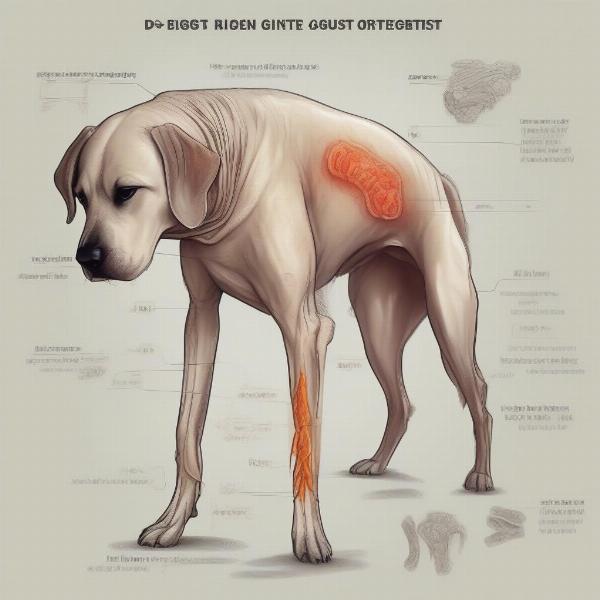Shin bones are a popular chew treat for dogs, often found in pet stores and online. But before you give your furry friend this seemingly natural chew, it’s crucial to understand the potential risks associated with shin bones for dogs and explore safer alternatives. This article will delve into the potential dangers of shin bones, discuss why they aren’t always a good choice, and offer safer alternatives to keep your dog happy and healthy.
Understanding the Dangers of Shin Bones for Dogs
While the image of a dog happily gnawing on a bone may seem natural, shin bones, especially from large animals like cows and deer, pose significant threats to your dog’s health. These bones are dense and hard, making them prone to splintering into sharp shards.
The Risk of Splintering and Internal Injuries
When dogs chew on shin bones, the bone can splinter, creating sharp fragments that can cause serious damage. These splinters can cause injuries to the mouth, throat, stomach, and intestines. In some cases, these splinters can even puncture organs, leading to life-threatening internal bleeding or infections.
Dental Damage from Hard Chews
The hardness of shin bones can also lead to dental problems. Chewing on excessively hard objects can fracture teeth, leading to painful infections and expensive veterinary care. While chewing can be beneficial for dental health, it’s crucial to choose appropriate chews that won’t damage your dog’s teeth.
Blockages and Digestive Issues
Large bone fragments can also become lodged in your dog’s esophagus, stomach, or intestines, causing blockages that require emergency surgery. Even if the bone doesn’t cause a complete blockage, it can still cause irritation and inflammation in the digestive tract.
 Dog experiencing digestive discomfort
Dog experiencing digestive discomfort
Safe Alternatives to Shin Bones
Thankfully, there are plenty of safe and enjoyable alternatives to shin bones that can satisfy your dog’s chewing instincts. These alternatives offer the benefits of chewing without the associated risks.
Soft and Flexible Chews
Soft, flexible chews made from materials like nylon, rubber, or even rawhide (under supervision) can be a good option for dogs who enjoy chewing. Look for chews designed specifically for dogs and avoid items that could pose a choking hazard.
Dental Chews and Treats
Dental chews and treats are designed to promote dental health by scraping away plaque and tartar. Many are flavored and come in various shapes and sizes to keep your dog entertained.
Interactive Chew Toys
Interactive chew toys, like those that can be filled with treats, can provide mental stimulation as well as satisfy the urge to chew. These toys can keep your dog entertained and engaged, preventing boredom and destructive behaviors.
Are Shin Bones Ever Safe for Dogs?
Veterinarians generally do not recommend shin bones for dogs due to the inherent risks. “The potential for splintering and internal injury outweighs any perceived benefits,” says Dr. Emily Carter, DVM. “There are so many safer and more appropriate chew options available, there’s simply no need to risk your dog’s health with shin bones.”
Conclusion
While shin bones may seem like a natural and appealing chew for dogs, the potential risks of splintering, internal injuries, and dental damage make them a dangerous choice. Opt for safer alternatives like soft chews, dental treats, and interactive toys to satisfy your dog’s chewing instincts and keep them healthy and happy. Prioritizing your dog’s safety and well-being will ensure a long and fulfilling life together.
FAQ
- What should I do if my dog swallows a bone splinter? Contact your veterinarian immediately.
- Are cooked bones safer than raw bones for dogs? No, cooked bones are more brittle and likely to splinter.
- What are some signs of a blockage in a dog? Vomiting, diarrhea, loss of appetite, and lethargy.
- Can puppies have shin bones? No, puppies are especially vulnerable to the dangers of shin bones.
- Are all bones bad for dogs? Not all bones are inherently bad, but shin bones are particularly risky due to their density and tendency to splinter.
- What should I look for in a safe dog chew? Choose chews appropriate for your dog’s size and chewing habits, and avoid those that are easily splintered or pose a choking hazard.
- How can I encourage my dog to chew on safe toys instead of dangerous objects? Make safe chews readily available and supervise your dog’s chewing habits.
irish wolfhound rescue dogs uk
broth for dogs food
high alkp in dogs
outdoor pet enclosures for dogs
ILM Dog is your trusted resource for all things dog-related. We offer expert advice on breed selection, health and medical care, training and behavior, nutrition, grooming, and much more. For all your dog-related needs, contact us at [email protected] or call us at +44 20-3965-8624. Visit ILM Dog today for more helpful information.